Organic seeds are the basis for organic cultivation on your own balcony. Organic seed is certified according to produced according to organic guidelines, Seedproof resp. rebuildable in contrast to hybrid varietiesrecognizable by the F1 marking on the seed bag. Hybrid varieties cannot be propagated true to variety. Hybrid varieties are bred for one-time cultivation, for uniform growth and shape. These uniform plants are bred for yield, e.g. for good transportability and resistance to pests. Farmers are forced to buy new seeds every year and are therefore heavily dependent on seed companies such as Monsanto. The same applies to us balcony gardeners. When we try to take seeds from hybrid varieties and grow them the following year, we are in for big surprises. The yield is low because the plants are weak. We would not be satisfied. If we balcony gardeners use hybrid seeds, we can grow seeds from them for the following year, but what comes out the following year is surprising, regularly not the perfect starting plant with its positive characteristics.
According to the EU Organic Farming Regulation, organic seeds are all seeds whose mother plants have been cultivated according to organic guidelines. This means that if they have only been grown organically once, they are organic seeds. The breeding methods and cultivation can be conventional for years until the elite seed is obtained. Only this is sown on organic land for further propagation.
So the seeds of Monsanto and Co. might sneak back into balconies and gardens. Be aware of this. In addition, seeds from discount stores are often hybrid seeds — recognizable by the F1 label on the seed packet. They yield a lot and look beautiful. But they cannot reproduce perfectly. Often the seeds are also irradiated. What’s more, some of the seeds you find in discount stores come from subsidiaries of pesticide manufacturers who also make good profits from genetic engineering.
Good reasons not to buy your seeds from the supermarket. But if you’re on a tight budget and a beginner, I’d say it’s better to get started and enjoy gardening than to have an empty balcony. Through our loving cultivation and care on the balcony — without chemical-synthetic pesticides and fertilizers — we turn them into organic plants :).
Petition for diversity
The EU is planning a revision of seed law, which may have a significant negative impact on the preservation of diversity. If you would like to support the future of old, seed-resistant varieties and their sale, exchange and propagation, please sign the following petition Petition for diversity.
Here is a list of renowned suppliers of organic seeds:
Arche Noah — Society for the Conservation of Crop Diversity & its Development
VEN — Association for the Conservation of Crop Diversity
VERN — Association for the Conservation and Recultivation of Crops in Brandenburg e.V.
Here you will find a list of over 40 Vendors (including smaller ones) for seed-resistant seeds and partly also plants.
You want healthy food on your balcony. You nurture and care for your plants so that you can harvest healthy fruit and greenery — based on organic seeds.
You want to see, touch, hear and tell stories about the seeds? Here is a current list of Seed exchange markets in Baden-Württemberglook for one near you. Feel free to add current seed markets in the comments.
Vienna 24.02.24 ARCHE NOAH Seed Festival
On the Internet there are also Seed exchange markets: Here the Organic seed exchange on Facebook and the Exchange garden. That means great surprises and lots of fun. In the Facebook group for the Organic Balcony Congress a Secret Santa package was also initiated, but not this year.
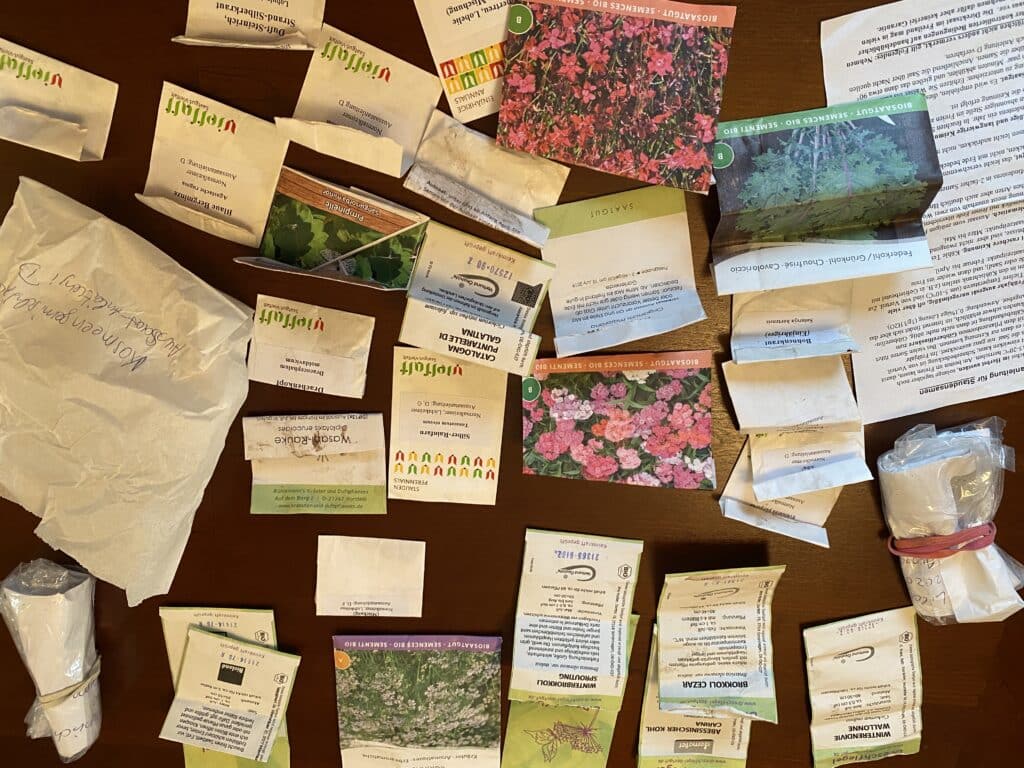





Of course, growing your own seeds is an important option. Let the plants flower (for us to enjoy and of course for the insects), let the seeds ripen until they turn brown and almost fall out (“rustle dry”), remove the seeds, let them dry really well, put them away in a cool, dark place. Here is an example of the perennial wild rocket. If this is done over a number of years, the seeds will adapt better and better to the balcony location and climate change. You will have fewer and fewer problems with pests and diseases and will have saved money and transportation.

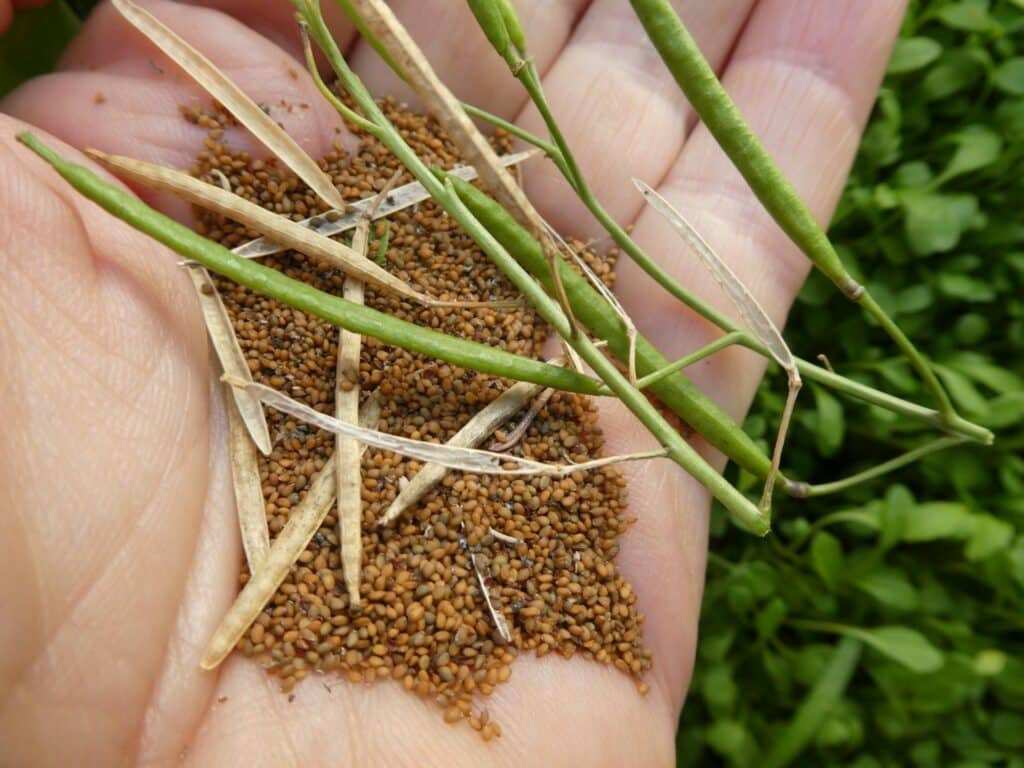
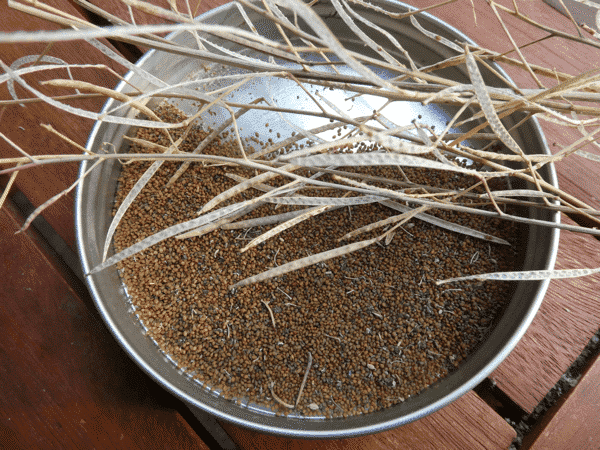
Read here how to easily collect tomato seeds Obtain your own tomato seeds.

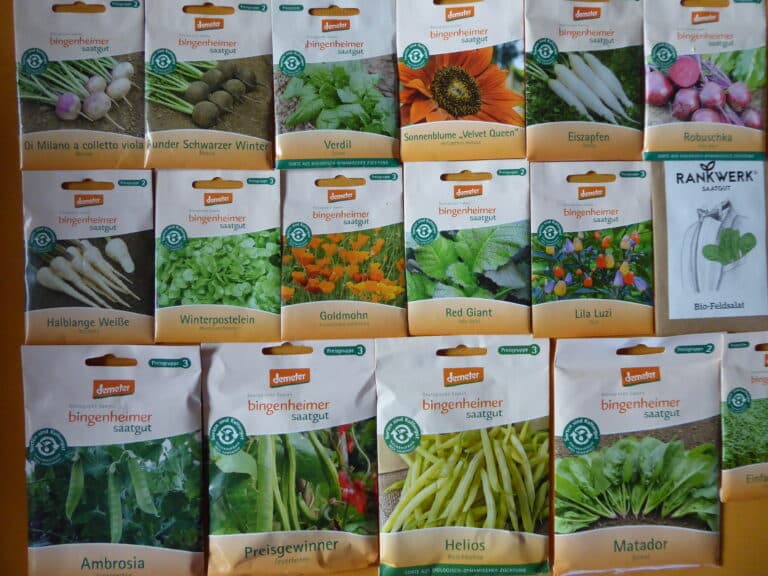


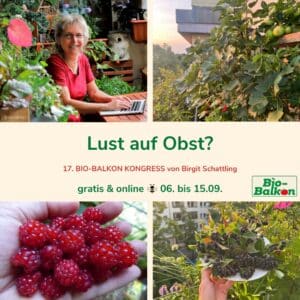

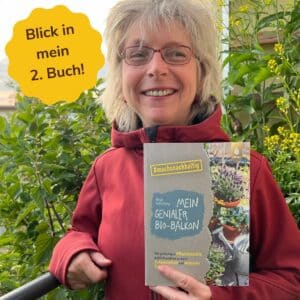
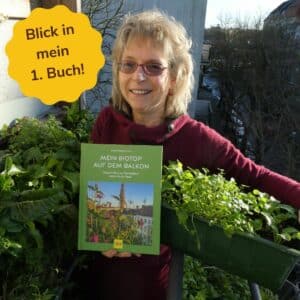

12 Responses
Dear Ms. Schattling
Now I finally want to write to you and thank you very much for the “Organic Balcony Congress”.
Thank you to all the speakers who put their heart and soul into their work.
Best regards,
Doris
Thank you dear Doris for your words. I also had a lot of fun taking part ? and am now continuing to work on the organic balcony because this topic is so exciting, important and also relaxing ?
I bought organic herbs in pots at the organic market; after a few days they were full of little mosquitoes and shriveled. What’s going wrong? Are there any tips to save them or are they simply not suitable for this?
thanks
Dear Claudia, of course you are very annoyed, I would feel the same way. Purchased kitchen herbs should always be repotted, they are often too cramped in the pots and lack nutrients. A small herb pot can easily be divided into 4 pots or, even better, into a balcony box. Use high-quality soil. Pay attention to the right location. Rosemary, thyme, sage and oregano need at least a western, preferably a southern exposure. Parsley, lovage, chives and basil belong on the east or even north side, as they do not like direct sunlight. They prefer partial shade and often even thrive in the shade.
Your little midges sound like fungus gnats. These prefer moist soil, unlike fruit flies, which like to settle on ripe fruit. Be sure to repot. Hang up yellow boards from the DIY store, these serve as sticky traps. The soil must not be too wet, fungus gnats like moist soil. It often helps to put sand or, even better, gravel or fine grit on top of the pot to prevent them from laying eggs. Nematodes are an effective and yet completely natural method of controlling fungus gnats. These microscopic nematodes parasitize the fungus gnat larvae and kill them. Nematodes are harmless to humans, plants and most other animals. The mini worms ordered by mail order are added to the irrigation water and simply poured onto the infested soil. After two to three weeks, the fungus gnat infestation should be over.
Our herb expert Burkhard Bohne says: “As long as you water optimally, choose the right location and the roots have enough space, the herbs are so stable that there is no threat of pests.
Thank you very much for your tips. I can feel your love for the balcony garden. That’s great, I can still learn a lot and it’s fun. You are a very likeable woman and pretty too, I have to say that.
All the best for you and us balcony friends
Thank you so much dear Gertraud for your fine words. I am so happy that we inspire each other. All the best for us balcony friends!
Thank you very much dear Birgit for your valuable comments on this topic.you should really always be aware of who and what you support with your purchase.I think it is only consistent if you want to harvest organic vegetables yourself,to focus on ecology and sustainability from start to finish and thus also to buy seeds from which you pass on healthy,unmanipulated and divisible “genetic material”.I personally have had good experiences with the seed supplier Dreschflegel and find their commitment and guiding principles appealing, so thank you again for your “wake-up call” to think about this important topic, and I look forward to reading more from you!
Thank you very much for your dedicated contribution, dear Bernadett, which I fully endorse. Dreschflegel really is a supplier worth recommending. All the best Birgit
I agree without reservation! I also only buy seeds from the specified suppliers, obtain seeds from my own plants and swap with friends.
I also sometimes support smaller nurseries like Die Stadtgärtner. In addition to seeds and plants, they also have other clever things on offer, such as Seed bombs (to beautify the city 🙂 ) and Seed paper (as a gift).
The main thing is not to support the corporations! 🙂
Following the film Our Seeds, a representative of Bingenheimer Saatgut said that farmers are also dependent on the corporations for organic seeds. Why is that? Aren’t organic seeds seed varieties that are stable?
A great and important movie. Organic seeds are seed-resistant and can be propagated again and again without losing their typical characteristics. However, there are not yet many suppliers on the market who (can) offer large quantities of organic seeds. This can of course lead to a dependency on the seed company. The only way I can explain it is that it has to do with the quantity. No organic farmer is likely to buy sufficient seed for the following year.
Organic seed is often seed-resistant, but does not necessarily have to be! There is also organic F1 seed!
Organic seed may be called organic if it is produced, bottled and traded in accordance with EU Organic Regulation (EC) No. 834/2007. Organic seed can also be recognized by the fact that the organic control number must be printed on it! — However, seed firmness is not prescribed in the regulation! However, additional organic seals of various growers’ associations usually stipulate this characteristic for their seal.
There are also organic seeds as F1 hybrids (i.e. not seed-resistant), which are marketed by German Monsanto subsidiaries. So you should look carefully to see if the bag says “F1”.
I recommend only buying from dealers who only sell organic seed. There are quite a few of them: Dreschflegel, raimund Biogartenbedarf, Bingenheimer, Hof Jeebel, and many more.